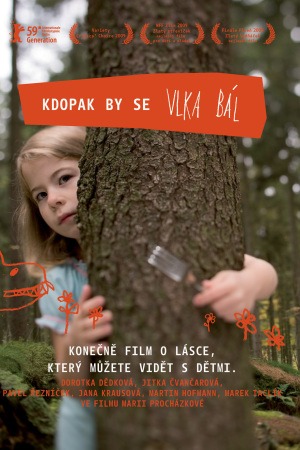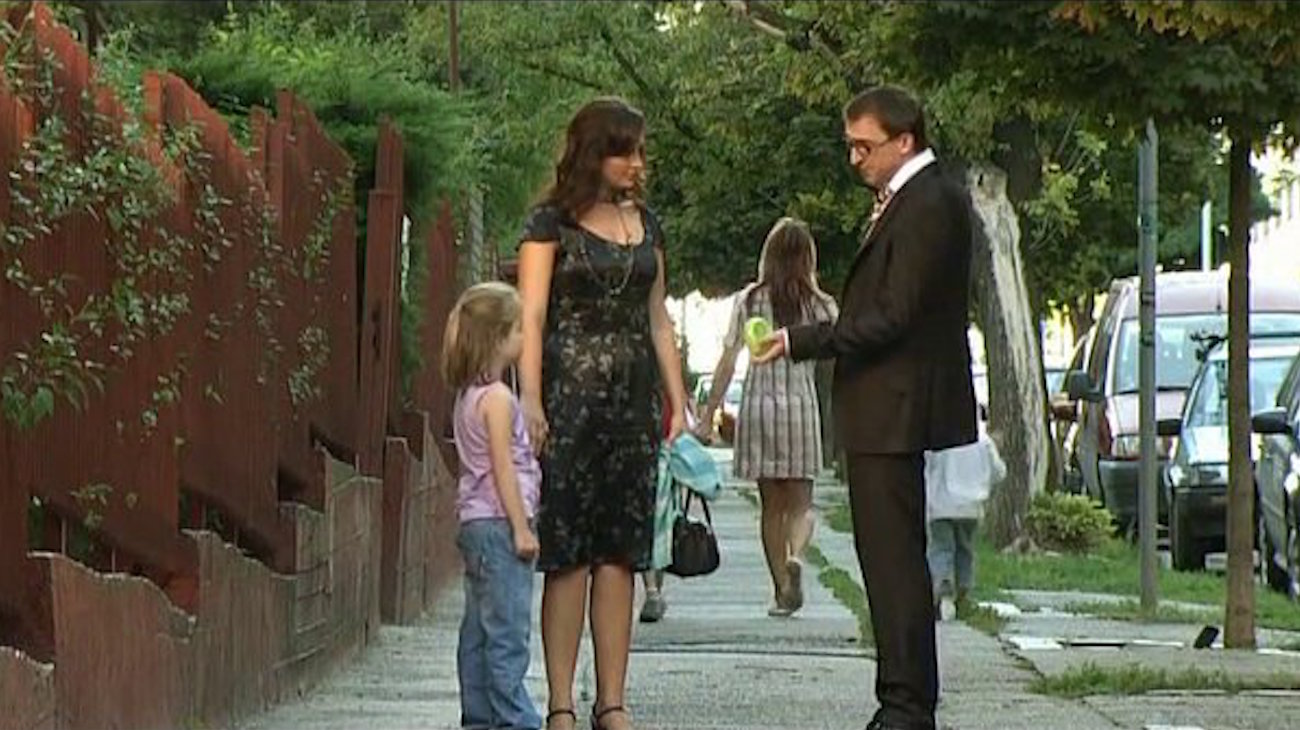
The 45th Chicago International Film Festival
Advertised as a "fairy tale for grown-ups", which isn't precisely inaccurate, Who's Afraid of the Wolf is the story of a little girl, Terezka (Dorota Dedková) who is a little bit too young, or at least much too Romantic, to figure out that there's a difference between reality and her very well-developed fantasy world, in which she is Little Red Riding Hood and her mother (Jitka (Cvancarová) is an alien being, and this causes her parents frustration at a time when there's frustration a-plenty already; Terezka's dad (Pavel Reznícek) has been working excessively long hours at his airport security job, her mom is more and more open about missing her glory days as an opera singer (she quit, very willingly, to be a good mother to Terezka, and seems to have some buyer's remorse), and oh boy! her old flame, Patrik (Martin Hofman) has just come back from Tokyo, ostensibly to play cello in his hometown now that he's made it big, but mostly because he apparently wants to re-kindle that old romance that ended because he put his career first.
There are two things going on here that I usually really love: stories about children profoundly misunderstanding what the adults around them are doing, and stories about children escaping from the misery of their daily lives into a rich fantasy world; and I managed to convince myself for a while that I liked Who's Afraid of the Wolf, because it's very easy to form snap judgments in a festival environment that have little connection to the movie you actually just saw. But with a few days between me and the movie, I have to concede that there's not much to it, one way or the other. With no offense meant to Dedková, a charming and distinctly talented child actor, Terezka is a flat character, who undergoes essentially no re-awakening or growth as a result of her experiences. She has no concept of what's happening around her, her actions nevertheless affect everything and everyone, and at the end everything is just like it always was. It is of course the privilege of a fairy tale to present the ending as a restoration of everything back to exactly the way it was at the start, only happier, but it's tricky for a film to carry off the same trick, especially when the audience is a great deal smarter than the POV character, and so what seems to her like the (low-stakes) stuff of fantasy is to us the (high-stakes) stuff of family tragedy.
It doesn't help matters any that director Marii Procházková (who struck me as a very earnest and sincere person, and it makes me feel a bit shitty to talk badly of her) shoots the whole movie in a rather slack, plain style; only Terezka's fantasies (and these are not as frequent as they should be), have any kind of spark to them, although to be fair they have quite a lot of spark. I suspect that Procházková is attempting to underline the difference between Terezka's free-wheeling interpretation of everything that happens in the most childlike, fantastic way with the banal, unpleasant reality of what's happening. And I suppose if that is the purpose, it works fairly well.
Although this is a well-acted film, with a dramatic scenario at the core that ought to provide a fair degree of emotional impact, there's still something that's just plain off about it. I think it's ultimately Terezka. She seems so detached from her own life that she's basically indestructible, and rather than her fantasies providing the only escape hatch for her to get away from her daily sorrows, it seems rather like she's so busy spinning those fantasies that she doesn't even notice that she has a real life.
There are two things going on here that I usually really love: stories about children profoundly misunderstanding what the adults around them are doing, and stories about children escaping from the misery of their daily lives into a rich fantasy world; and I managed to convince myself for a while that I liked Who's Afraid of the Wolf, because it's very easy to form snap judgments in a festival environment that have little connection to the movie you actually just saw. But with a few days between me and the movie, I have to concede that there's not much to it, one way or the other. With no offense meant to Dedková, a charming and distinctly talented child actor, Terezka is a flat character, who undergoes essentially no re-awakening or growth as a result of her experiences. She has no concept of what's happening around her, her actions nevertheless affect everything and everyone, and at the end everything is just like it always was. It is of course the privilege of a fairy tale to present the ending as a restoration of everything back to exactly the way it was at the start, only happier, but it's tricky for a film to carry off the same trick, especially when the audience is a great deal smarter than the POV character, and so what seems to her like the (low-stakes) stuff of fantasy is to us the (high-stakes) stuff of family tragedy.
It doesn't help matters any that director Marii Procházková (who struck me as a very earnest and sincere person, and it makes me feel a bit shitty to talk badly of her) shoots the whole movie in a rather slack, plain style; only Terezka's fantasies (and these are not as frequent as they should be), have any kind of spark to them, although to be fair they have quite a lot of spark. I suspect that Procházková is attempting to underline the difference between Terezka's free-wheeling interpretation of everything that happens in the most childlike, fantastic way with the banal, unpleasant reality of what's happening. And I suppose if that is the purpose, it works fairly well.
Although this is a well-acted film, with a dramatic scenario at the core that ought to provide a fair degree of emotional impact, there's still something that's just plain off about it. I think it's ultimately Terezka. She seems so detached from her own life that she's basically indestructible, and rather than her fantasies providing the only escape hatch for her to get away from her daily sorrows, it seems rather like she's so busy spinning those fantasies that she doesn't even notice that she has a real life.
Categories: ciff, coming-of-age, czech cinema, fantasy






